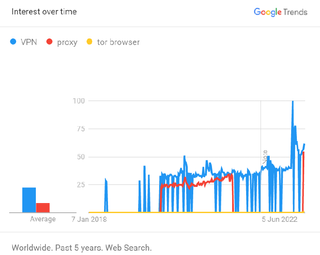As the time we spend online across all our digital devices grows, so do the risks of falling victim to cyberattacks.
There were 82% more ransomware (opens in new tab)-related data leaks last year and online censorship and internet shutdowns increased worldwide, according to Freedom House (opens in new tab). Still, too many big tech companies are abusing users’ data.
It’s not then surprising that even the less techie of us found themselves looking for the right security software to download – among the best VPNs and antivirus software, proxy servers and password manager tools.
When it comes to browsing the web anonymously, VPN apps, proxy servers and Tor browser are the top options out there. But, which one is the most popular?
This was precisely what web hosting provider Fasthosts wanted to know. Namely, how users have changed their online privacy protection habits. What they found is that VPNs are the ones tracing the path forward.
Read on for all the details!
Proxies down, VPNs up
“Considering how popular VPNs have become alongside a continued growth in interest for cybersecurity, it’s not surprising to see that the tech has seen such a dramatic increase in searches,” said Michelle Stark, Sales and Marketing Director at Fasthosts.
Their data shows that the interest in VPN companies have been thriving since 2015. Virtual private networks providers are reaching more and more people seeking to secure their digital life.
NordVPN has registered a staggering rise in searches of 2,523%. Its closest competitor ExpressVPN has reached 597% more searches, while a 490% increase is what has been experiencing Surfshark since its inception in 2018.
At the same time, the interest for proxy servers keeps reducing. Despite a spike over last year, the searches for such software fell down a considerable 62% during the same period. Among on-and-off drops for the past few years, also the Tor browser saw a decline in popularity of 46%.
Fasthosts believes there are a few reasons behind this trend.
The two main factors seem to be a growing emphasis on cybersecurity among all kinds of users and the rise in streaming services.
VPNs are generally easier to use than proxy servers. They can also accommodate a wider range of user cases, while still offering extended security features. It is also worth noting the boost in marketing campaigns from VPN providers over the last few years.
Whatever the reason behind the choice of tools, the trend shows how increasingly more users worldwide are worried about their online privacy and are willing to learn how to protect their data.
“We’re even seeing people using virtual private servers (VPS) to create their own VPNs for further safety, the lengths people are willing to go to to protect themselves in an increasingly digital world,” said Stark.
“I can’t imagine we’ll see interest in these services wane anytime soon, either for security reasons or to access a whole bevy of otherwise unavailable streaming content, so it will be interesting to see how corporations adapt to this virtually invisible data-blocker.”
Proxies vs Tor vs VPNs: Which one to choose?
Even though the goal of VPNs, proxies and Tor is ultimately the same – protect users anonymity to boost their online privacy – the way each software does that differs.
A proxy works as a gateway between your device and the websites servers you access. As all the requests will pass through the proxy server instead, it allows you to hide your real IP location and bypass geo-restrictions.
A VPN is very similar to a proxy. It hides your IP and makes you appear in an entirely different location in the world with just a few clicks. However, in this case, all the traffic leaving the device is encrypted inside the VPN tunnel so that intruders cannot access your information in transit. You can also check our Proxy vs VPN explainer for more details.
The Tor browser is a volunteer-run free and open-sourced secure browser. It follows a practice known as onion routing. It routes the traffic through at least three servers, encrypting the data each step of the way to secure as much privacy as possible.
Despite being very secure, Tor does have a few drawbacks. More encryption can slow down your connection, for instance. The service also has the stigma of being associated with cybercrime, meaning sites often block access.
VPNs seem to be better to evade crackdown by employing new obfuscation technology, being that the exit nodes of proxies and Tor are more recognizable. So, a streaming VPN is your best bet to unlock foreign catalog on streaming platforms.
However, all this doesn’t mean that there are no uses for proxies and Tor.
WhatsApp’s latest update is now offering an unprecedented proxy support to allow users to freely communicate during internet shutdown, for example. And, even VPN providers recommend using Tor together with the VPN app when privacy is paramount.
Source: www.techradar.com












